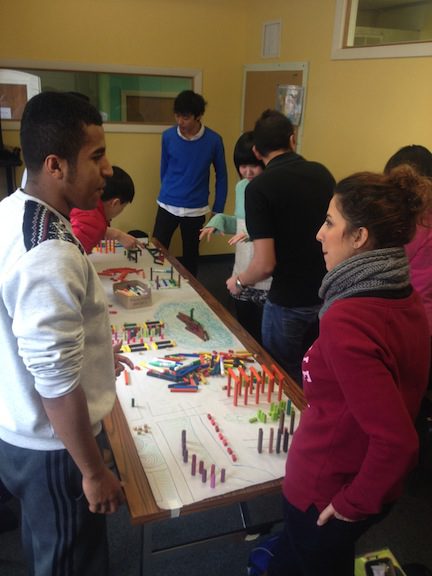After months–or years—of studying online at home or taking English classes in their home countries, millions of students want a breath of fresh air.
Sunny days, warm weather, cool winds–summertime is a wonderful time to enroll in an Intensive English program.
Just to be clear about the meaning of an Intensive English Program meaning: it means an English course consisting of 18 classroom hours spread out over 4 or 5 weekdays from Monday to Friday.
Your goal is 24/7 immersion in U.S. culture and English. This immersive experience is the best–maybe the only–path to English fluency.
Besides daily English-only instruction, the best intensive English programs in the USA also offer warm, welcoming home stays in friendly local communities like Northampton Massachusetts.
As 2022 warms up in the USA, let’s run through some top reasons to join an Intensive English Program for international students.
#1 Cultural exchange
Summer is a time of travel, and English students from around the world are making plans.
A big benefit of an Intensive English Program for international students is cultural exchange. Using English as a common language, you can reach a deeper understanding of cultures around the world.
Using English as a common language, you can reach a deeper understanding of cultures around the world.
You broaden your mind to new perspectives. You open doors to future opportunities.
In an Intensive English Program you can find people from China, France, Mexico, Peru, Russia, Senegal, Taiwan, Ukraine, and more working together and learning from each other.
You develop your status as a citizen of the world by studying English with a diverse group of students in an Intensive English Program. You hear different accents, learn new customs, and make worldwide friendships that can last a lifetime.
#2 Outdoor cultural events
Summertime offers many outdoor opportunities to encounter natural English and authentic US culture.
For example, if your Intensive English program is located in a city like Northampton, Massachusetts, you can attend outdoor farmer’s markets. At a farmer’s market, you can get locally made food as well as meet local farmers and businesspeople.
made food as well as meet local farmers and businesspeople.
Besides farmers markets, there are outdoor music festivals and arts festivals. Inspired by songs, sculptures, and painting, you and your classmates in your intensive English course have a lot to speak and write about.
 Don’t forget about the beauty of your natural surroundings. Areas like the Connecticut River Valley in New England offer scenic mountain hikes, nature walks, and bike paths.
Don’t forget about the beauty of your natural surroundings. Areas like the Connecticut River Valley in New England offer scenic mountain hikes, nature walks, and bike paths.
While you’re out and about, you’ll enjoy the sights and sounds that make English vocabulary unforgettable. Interacting with native speakers, you learn how English is used in real life, rather than in textbooks.
#3 Teamwork
The best way to learn English is to practice speaking in pairs and groups, which happens everyday in a summer intensive English program.
Studying alone with textbooks and Youtube can get you started, but it won’t take you far. To succeed at work or school, you need to collaborate on a team in English. Listening, responding, agreeing, disagreeing, negotiating, clarifying–all these communication skills are essential.
The best intensive English programs in the USA teach you how to use English in different social settings for purposes such as:
settings for purposes such as:
- to complete team projects
- to debate topics
- to role play scenarios
- to play games
- to lead a meeting
- to give interactive presentations with an audience
Summer intensive English programs bring together adults from many walks of life. It’s like a little multinational company or university–except the goals involve speaking English for fun and information.
#4 Academic English
For international students entering university in the fall, the summer is well-spent preparing for the upcoming semester.
If your college program starts in September, it’s smart to spend July and August improving your English and getting comfortable to life in the U.S.
Imagine arriving in the U.S. just a couple days before your university classes begin. You have to move into your dorm, plan a class schedule, manage culture shock, adjust to an English-only environment… Crazy!
Keep your sanity. Come to the U.S. early.
 Yes, U.S. universities offer international students extra help like academic advising, personal counseling, and ESOL tutoring. However, you may still end up feeling isolated, confused, uncertain how to move forward.
Yes, U.S. universities offer international students extra help like academic advising, personal counseling, and ESOL tutoring. However, you may still end up feeling isolated, confused, uncertain how to move forward.
An Intensive English Program for international students provides a soft place to land.
One big part of university life is understanding the spoken English of professors and classmates–and then responding effectively. The accents in Massachusetts sound different from the accents in other states like Florida, Texas, and Georgia. An IEP acclimates you to communicating with native speakers in real life settings.
Another big part of U.S. university involves reading books, researching topics, and writing essays. An intensive English writing course gives you the essential English tools to hit the ground running with your high stakes coursework.
When writing English for academic purposes, you need:
- to create interesting arguments
- to revise your reasoning based on feedback
- to choose appropriate academic vocabulary
- to perfect the grammar, vocabulary, and formatting of your final revision
And that’s just scratching the surface of how to improve academic and business English writing skills.
#5 Business English
You already know the importance of English to pursue a career in business, law, health care, journalism, and many more globalized fields. Summer is an attractive moment to make the most of vacation time by immersing yourself in English.
A new job, a better promotion, a wider professional network–all these goals require business English skills. However, as a career-oriented adult, you have a limited time and mental space available. An intensive advanced English course can teach you essential grammar structure, idioms, and communication techniques.
U.S. workers must read and write many emails, produce written reports, and speak on the phone. Combining both a friendly tone and appropriate professionalism, Business English is direct, clear, and well-organized.
and well-organized.
In a summer intensive English course, you learn appropriate grammar, formatting, and vocabulary for professional emails. You practice group discussions and engage in team projects using diplomatic English expressions and the right body language and gestures for the context.
Another big benefit of an IEP is to learn how to excel at a job interview. Working with diverse classmates, you can practice strategies for answering typical job interview questions in the US.
#6 General English
Going to the bank, making appointments, running errands–general English skills are the key to daily life. An Intensive English Program teaches you essential general English, such as:
- basic verb tenses for every day, yesterday, tomorrow, and now.
- phrasal verbs (= verb + preposition) that native speakers use A LOT, like run into, turn on, and throw away.
- word order of sentences and questions
- words for everyday actions and objects
An intensive English communication program gets you talking about daily tasks, hobbies, and opinions. You build your vocabulary bank of people, places and things.
Plus, naturally spoken English sounds different from formal textbook English. During your immersive IEP experience, you’ll hear lots of relaxed pronunciation, like talking about the future by saying “I’m gonna do it” instead of “I’m going to do it.”
With the support of an experienced ESOL instructor, you can build general English proficiency as well cultural fluency in the context of an intensive English learning program.
#7 Culture shock
Whether working on academic English, business English, or general English, every English learning in the U.S. shares one common experience: culture shock.
 Summer intensive programs provide both language and cultural training to ease the impact of culture shock.
Summer intensive programs provide both language and cultural training to ease the impact of culture shock.
Upon arriving in the U.S., you undergo the culture shock of everyday life. Restaurants, shops, traffic, rules, laws, behavior–everything’s different. You’re already expecting that.
What you may not expect is academic culture shock if you’re an international student. If you’re a working professional, workplace culture shock may take you by surprise.
Both academic culture shock and workplace culture shock can cause serious problems.
The U.S. has its own unique academic environment on campus. Professors in the U.S. may have different expectations from professors in your country.
For instance, in the U.S. students are expected to participate actively in class. You’re expected to volunteer and defend your own opinions, even if your opinions are different from the professors.
Academic originality is highly prized. Plagiarism, which means copying words and ideas in your essays, can cause you to fail the class or even get expelled. Formal exams may be only a small part of your final grade, along with original essays, short answer tests, and class discussions.
In an Intensive English Program, you can fix big mistakes like being passive in class or plagiarizing essays with the help of your ESOL instructor. Thankfully, you can avoid making these mistakes in college, when your grades will suffer.
Similar to U.S. academic culture, U.S. workplace culture is highly communicative. Besides the technical skills and qualifications necessary for the job, employers look for soft skills like creative problem-solving, initiative, and leadership.
Similar to how college students in a U.S. classroom are expected to speak up during discussions, employees in a U.S. workplace are expected to speak up during meetings. You don’t wait for the boss to ask for your thoughts, just like you don’t wait for the professor to call on you for a contribution.
Professional networking involves small talk about appropriate topics like travel, sports, entertainment, and weather (while avoiding topics like marital status, age, politics, and religion). Cultural sensitivity is a must.
A summer Intensive English program for international students teaches more than just academic English and business English topics. English is more than just grammar, vocabulary, and page formatting (though they still matter).
The best Intensive English programs also provide cultural training. With a better appreciation of different cultural expectations, norms, and values, you’re better equipped to succeed at school or work in the US. And while expanding your cultural understanding, you have fun learning about new people and new worlds.
Simply put, the best summer Intensive English Programs are both educational and enjoyable.
Related articles about how to learn English
While you book your Intensive English course or other academic English or business English course, improve your language skills by reading our free English articles or watching our free English lesson videos.
- Understand the differences between and the importance of Academic English vs General English.
- Study how to improve English for academic purposes.
- Learn how business and academic English lessons can broaden your mind and open up a world of opportunities.
- Learn techniques for brainstorming essay ideas for typical assignments in Academic English lessons or business English courses.
- Learn techniques for outlining essay ideas for typical assignments in Academic English lessons or business English courses.
- Watch fun and informative videos with English tips useful for work, school, and creative writing. We continuously update our free English playlists of easy-to-understand videos.
- May in the Intensive English Program
- How intensive is an intensive English course at ILI?
- In-person IEP classes set to resume in August!
- Intensive English: Top 5 Really Easy Tips and Tricks to Enjoy Mastering Your English
- Best TV Shows to Improve Your English While Enjoying Yourself
- ILI Intensive English Program (IEP) students build community with Janelle!
- Intensive English: Top 6 Really Easy Tips and Tricks to Enjoy Mastering Your English
- What is an Intensive English Program?: A Complete Guide
- Interview with Edwin Cubillos, Colombian photographer and peace activist
Bringing decades of passion as educators, at ILI Massachusetts we believe in open access to education for language learners around the world, regardless of race, religion, gender identification, physical and mental abilities, economic standing, documentation status, and educational levels.
